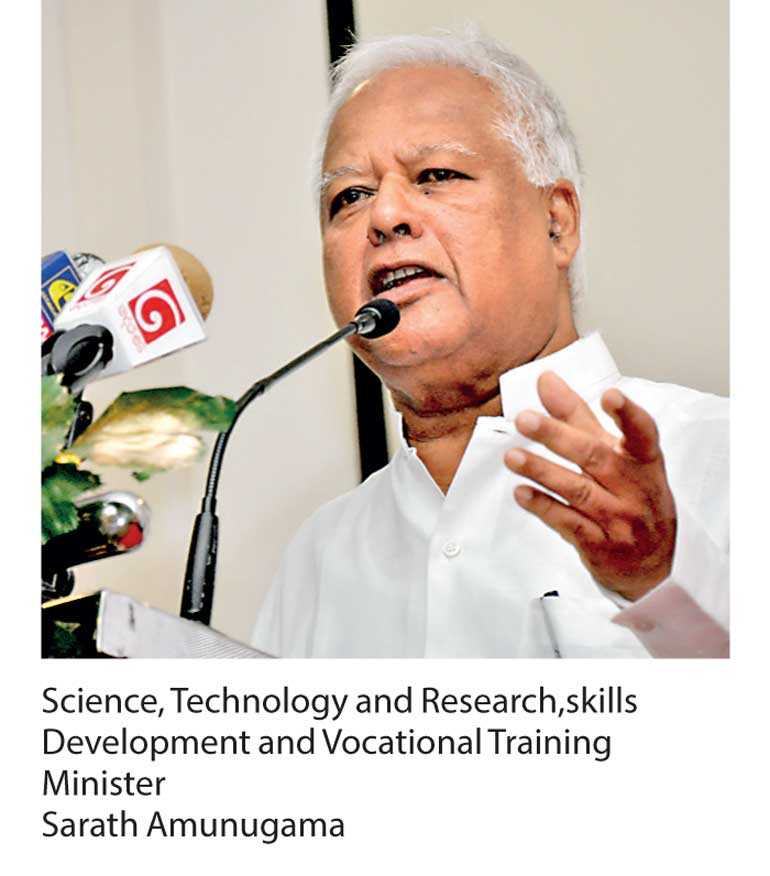Saturday Feb 28, 2026
Saturday Feb 28, 2026
Monday, 11 June 2018 00:00 - - {{hitsCtrl.values.hits}}

By Charumini de Silva
Science, Technology, Research, Skills Development and Vocational Training Minister Dr. Sarath Amunugama last week insisted that changes in policy, practices, staff retraining and engagement would be the only way to improve productivity across all sectors in Sri Lanka, which is a primary objective of the Government in progressing along the road to economic growth.
“Improving productivity in all sectors of the economy is a critical factor and if we fail in that I think we have to be honest enough to realise that many of our development goals improving the living standards of the people will suffer,” he said while speaking at a discussion on ‘Strategies to foster a culture of engagement and boost employee productivity’ organised by the National Human Resources Development Council of Sri Lanka (NHRDC), together with the Institute of Chartered Accountants of Sri Lanka (CASL), Association of Human Resource Professionals (AHRP) and the International Chamber of Commerce Sri Lanka (ICCSL) in Colombo on Thursday.
In a democratic setup he said that every government was compelled to employ people to the public sector, not as a way to achieve growth objectives but mostly as a hiring exercise, which caused constant disequilibrium.
Looking at the structure of the public sector corporations, he said that a large number of people were employed in the almost ‘unskilled’ or ‘non-skilled’ variety.
“There was always emphasis to hire workers as labourers or unskilled employees. I don’t think it is useful to just go on blaming the workers, but the administration also should be held responsible. I find that many of those workers are actually inclined to work and develop their enterprises. The general public perception is that they are idlers, loafers, and this is clearly not true. I also thought the same way, but with experience I’ve realised that it is not true. They’re quite capable of transformation but we need to engage them,” Dr. Amaunugama pointed out.
Highlighting that after a war almost every country in the world had to rely on the public sector to establish their basic economy to initiate growth, he said that all these elements converge to create a world in which investments and the nature of the economy were largely dependent on the public sector.
“Sri Lanka is a test case in this because we have been continuously emphasising the public sector. Though every Government has religiously stated in their Budgets that the private sector is the engine of growth, you will find that more and more resources are becoming diverted through the public sector; particularly the corporations. We have found that it is not a very efficient system of production, certainly in the age of competition. When there is a struggle to make the best use of our resources then we have to relook at the model through which we are going to make investments, the attitude including our human capital,” he added.
The Minister said that public sector productivity became a crucial aspect of growth in Sri Lanka and called on government institutions and enterprises to reexamine their HR practices, stressing that it was critical to address their concerns to use them in a much better way.
Pointing out that competition now was the name of the game, he stated in the post-Trump era countries had taken ruthless decisions in order to survive in a fiercely competitive environment.
He also said that cross currency global negotiations and global trade had witnessed dramatic shifts in policies as a result of the huge competition the world was facing today.
“Digitalisation is staring us in the face, so how do we cope with this modernisation of our procedure, all linked to productivity. What is the human cost? There is always a feeling that you can’t get rid of these guys, you have to retrain and use them for the modern objectives of your organisation. Particularlyfor a country like Sri Lanka, we have to look very seriously at the digitalisation process, using modern techniques and training our people; but I don’t think we have started any of these,” he added.
Pix by Lasantha Kumara